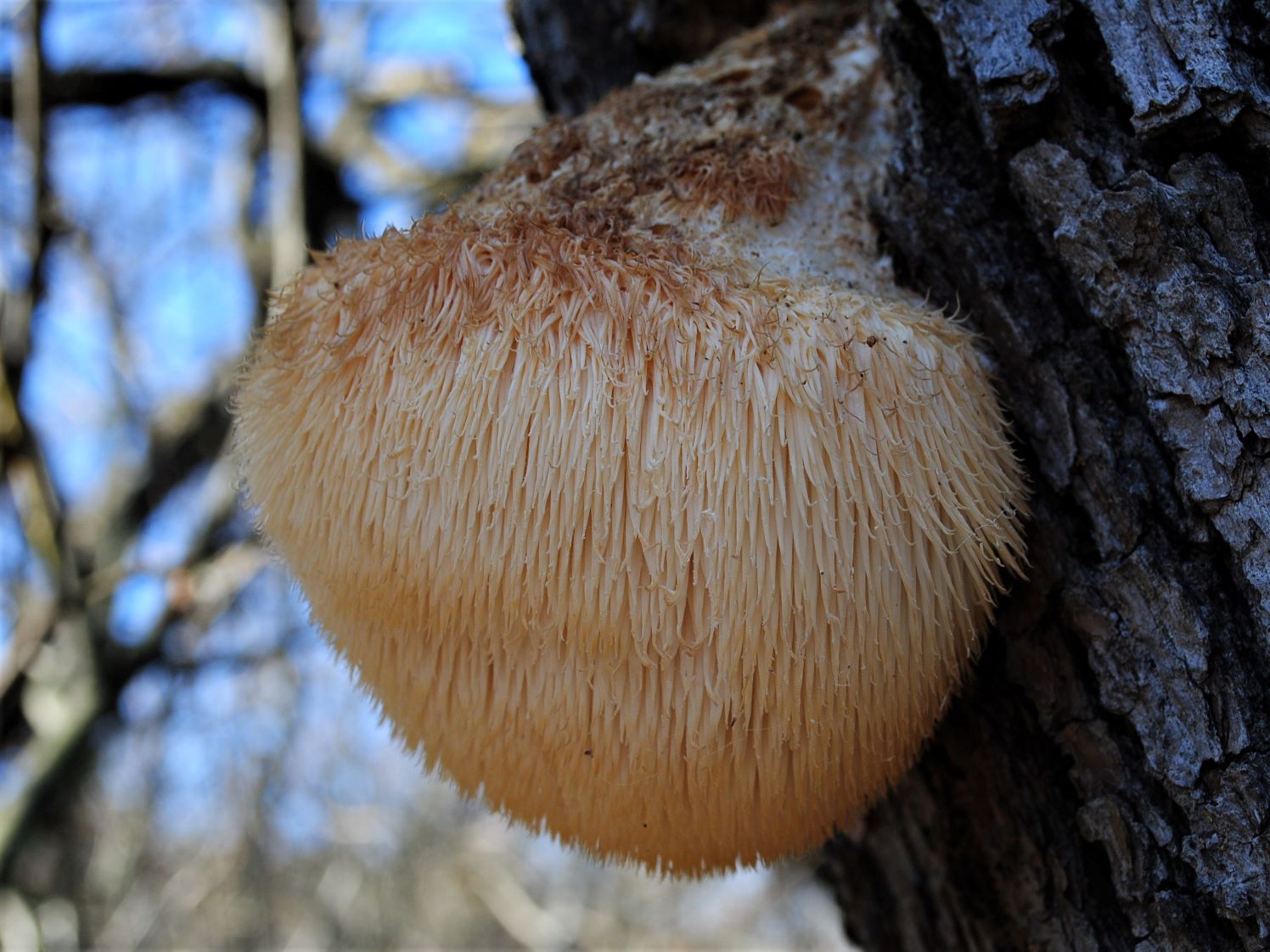Lion’s Mane mushroom, scientifically known as Hericium erinaceus, is a remarkable fungus recognized globally for its distinctive appearance and numerous potential health benefits. Often referred to as “The Smart Mushroom” by mycologist Paul Stamets, it has been a staple in traditional Asian medicine and cuisine for centuries.
What is Lion’s Mane Mushroom?
Lion’s Mane mushrooms are large, white, shaggy fungi that visually resemble a lion’s mane as they grow. They can also be described as looking like white “pom-poms” or having cascading tendrils. In Asia, it is known by names such as hou tou gu, yamabushitake (translating to “Mountain-Priest Mushroom” in Japanese), and Hóu Tóu Gū (Monkey’s Head mushroom) or Shishigashira (Lion’s Head) in China.
Beyond its unique look, Lion’s Mane is valued for both its culinary and medicinal uses. Many people describe its flavor as “seafood-like,” often comparing it to crab or lobster. It has a dense, slightly spongy texture, making it suitable for dishes like risotto, pasta, or soup. As a supplement, it’s available in various forms including raw, cooked, dried, steeped as tea, powders, liquids, capsules, and tinctures.
The mushroom is rich in vitamins like thiamine, riboflavin, and niacin, as well as essential minerals such as manganese, zinc, and potassium. Its beneficial effects are largely attributed to unique bioactive compounds, particularly hericenones and erinacines. These compounds are believed to be responsible for the mushroom’s brain-boosting effects. Erinacines are primarily found in the mycelium, while hericenones are limited to the fruiting body. These nootropic compounds can cross the blood-brain barrier and stimulate the synthesis of Nerve Growth Factor (NGF) and Brain-Derived Neurotrophic Factor (BDNF), which are crucial for the growth, repair, and normal functioning of neurons.
Where Does It Grow?
Lion’s Mane is a saprophytic fungus, meaning it grows on and digests wood. It is found in temperate climates across Asia, Europe, and North America. It prefers hardwood trees such as Maple, Oak, and Beech, growing on both living and dead trees, stumps, and logs. Its mycelial network plays an important role in forest ecosystems by recycling nutrients back into the soil.
Despite its wide distribution, Lion’s Mane is rare in many regions and is classified as regionally at-risk or endangered in several European countries, including the UK, where harvesting it from the wild is illegal. In the United States, it is generally legal to buy and use, but foraging may be restricted in some states due to its rarity, so local regulations should be checked.
The mushroom typically fruits in the summer or fall, with its distinctive fruit bodies lasting only days or weeks. The mycelium, however, is the primary and most active part of the organism, capable of living for months, years, or even decades as long as it can extract nutrients from its host.
Benefits of Taking Lion’s Mane as a Supplement
Lion’s Mane mushroom and its extracts offer a wide array of potential health benefits, many of which have been explored in animal, test-tube, and a limited number of human studies.
- Brain Health and Cognitive Function: Often called “The Smart Mushroom” due to its ability to support brain health.
◦ Protects against dementia and Alzheimer’s disease: Studies show it can stimulate the growth of brain cells through hericenones and erinacines. Animal studies indicate it may reduce memory loss symptoms and prevent neuronal damage caused by amyloid-beta plaques. A 2020 human study on people with mild Alzheimer’s disease found that daily supplementation significantly improved cognitive test scores.
◦ Enhances memory, focus, and mental clarity: It promotes neuroplasticity, the generation of new neural pathways in the brain. Human studies suggest improved mental performance speed, memory, attention, and executive function.
◦ Promotes nerve growth and repair (Neurogenesis): Its compounds stimulate NGF and BDNF, essential for the maintenance, survival, and regeneration of neurons. Research by Paul Stamets suggests Lion’s Mane mycelium is particularly potent in stimulating neurite outgrowth, enhancing nerve tip growth and myelination (regeneration of the nerve sheath). - Helps Relieve Mild Symptoms of Depression and Anxiety: Animal research shows anti-inflammatory effects that can reduce symptoms of anxiety and depression. It may also help regenerate brain cells and improve hippocampus functioning, a brain region involved in emotional responses. A small 2010 human study found that menopausal women consuming Lion’s Mane daily for a month reported reduced feelings of irritation and anxiety.
- May Speed Recovery from Nervous System Injuries: Research indicates Lion’s Mane extract may hasten recovery from brain or spinal cord injuries by stimulating the growth and repair of nerve cells and reducing brain damage after a stroke.
- Protects Against Ulcers in the Digestive Tract: It may protect against stomach ulcers by inhibiting H. pylori growth and shielding the stomach lining from damage. It can also reduce inflammation and prevent tissue damage in other intestinal areas, potentially aiding inflammatory bowel diseases like ulcerative colitis and Crohn’s disease.
- Reduces Risk of Heart Disease: Lion’s Mane extract has been shown to improve fat metabolism and lower triglyceride levels in animal studies. It may also prevent the oxidation of cholesterol and contains a compound, hericenone B, that can decrease blood clotting rates, thereby lowering the risk of heart attack or stroke.
- Helps Manage Diabetes Symptoms: Animal studies demonstrate its ability to significantly lower blood sugar levels and potentially reduce diabetic nerve pain by blocking the enzyme alpha-glucosidase.
- May Help Fight Cancer: Test-tube studies suggest Lion’s Mane extract can cause various human cancer cells (liver, colon, stomach, blood) to die faster and has been shown to slow the spread of cancer and tumor growth in mice.
- Reduces Inflammation and Oxidative Stress: It contains powerful anti-inflammatory and antioxidant compounds, which are believed to be root causes of many modern illnesses.
- Boosts the Immune System: Animal research indicates it can enhance immunity by increasing the activity of the intestinal immune system, partly due to beneficial changes in gut bacteria.
- Supports Mood, Digestion & Immune Health: Beyond brain benefits, Lion’s Mane is noted for promoting a balanced mood, digestive wellness, an engaged immune response, sleep quality, and balanced energy levels.
Important Note: While these benefits are promising, most of the research has been conducted on animals or in test tubes, and more human studies are needed to validate many of these findings and develop practical health applications. The FDA has also warned supplement makers about unverified health claims.
How Much to Take
There is no standard dosage for Lion’s Mane mushrooms. The optimal amount can vary based on factors like age, overall health, and the specific form of the supplement (fruiting body vs. mycelium, extract potency).
However, some studies provide insights into dosages used in human trials: - For improving cognition, some researchers recommend 3 to 5 grams per day.
- A 2020 study on people aged 50 and older with mild Alzheimer’s disease symptoms used three 350-mg capsules daily for 49 weeks (totaling 1.05 grams per day).
- A 2019 study for relieving depression, anxiety, and sleep disorders in overweight or obese individuals used three 400-mg capsules daily for 8 weeks (totaling 1.2 grams per day).
- Another trial on older adults with mild cognitive impairment used 250 milligrams of mushroom powder three times a day, totaling less than 1 gram.
- A study on menopausal women used 2 grams a day.
Given the variability, it is crucial to read the label and use as directed for any commercial product. It is highly recommended to consult with a doctor to determine the right dosage for you, especially since supplements are not regulated by the FDA like drugs.
Safety and Side Effects
Lion’s Mane mushrooms appear to be very safe, with no adverse effects reported in animal studies even at very high doses. However, individuals with allergies or sensitivities to mushrooms should avoid Lion’s Mane, as there have been documented cases of allergic reactions like difficulty breathing or skin rashes. There is limited research on the long-term safety or side effects in humans. Some mushroom supplement labels advise against use if pregnant, breastfeeding, or planning surgery

